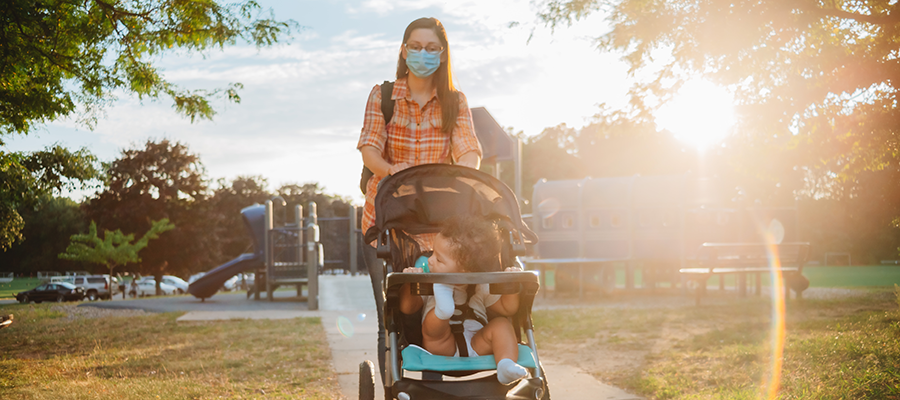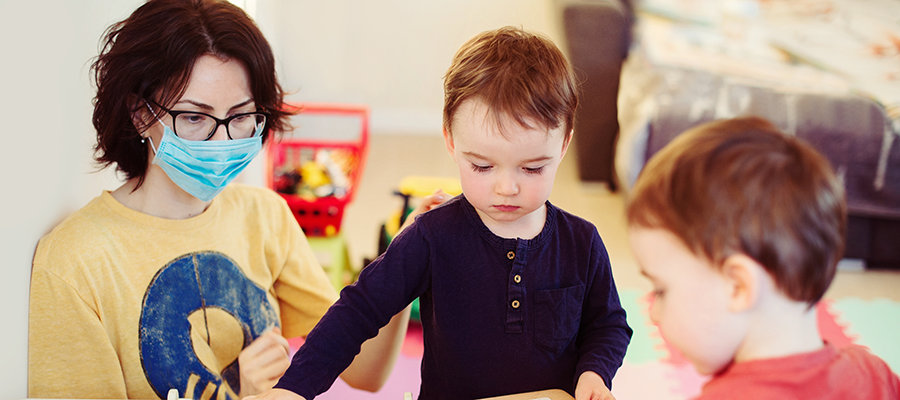
COVID-19 has sent many of us on a winding road of change and unprecedented challenges. As we now have three vaccines for the virus and the number of cases is starting to go down, many communities are starting to open up and return to a more “Pre-COVID-19” life. For many families, this means children returning to child care after having been away from the setting for a year or even longer.
Many parents are eagerly awaiting their child’s return to child care, while others may feel uneasy about sending their child back to child care. Some children may be excited to return to care while others may be fearful after a long time away. In addition, consider that some families may be dealing with sensitive issues such as experiencing homelessness, others who speak languages other than English may need additional supports and resources. Here are a few considerations for child care providers and others who support the day-to-day needs of children.
1. Updated Scheduling Considerations
Consider options to help children and families reacclimate themselves to child care. If you have the capacity, you may want to give families the option of starting out on a half-time schedule as they adjust to being back in the child care schedule. Discuss ahead of time any changes to routines, including scheduled events for eating, napping, outdoor play and so on. With more children returning to care, along with the need to social distance, wash hands more frequently and take temperature checks, activities that previously took a certain amount of time may now require almost twice the time. You may want to look at your current scheduling practices and update accordingly. Give yourself the grace to be flexible as you adjust.
2. Policy and Procedure Updates
Take time to make any needed policy and procedure updates prior to families returning to care so that families can be equipped with the most current and accurate expectations of them. Now is the perfect time to “hit the reset button” and make your child care policies and procedures clear and current for the “new normal.” Consider updated drop-off and pick-up procedures, new payment timeframes and current illness polices. Before updating your policies and procedures, you may also want to consider creating a plan of action based upon Centers for Disease Control and Prevention, state and local guidance. This will help ensure your policies are current and accurate.
3. Supporting Social/Emotional Needs
Even if children do not exhibit any reactions such as regression or aggression, there may still be other social-emotional support needs. Brace yourself for many different emotional responses from the children in your care. The first few days may look like “the honeymoon period” when children are just excited to be with other children and see friends again. After those days, when children realize this is a permanent situation, they may begin to show different behaviors such as sadness, crying, yelling, etc. It is important to remember that these children have been used to being at home and with family members for an extended period and may struggle with being away from them. Share a list of books and other resources to support children and families’ social-emotional needs as they transition into a new routine. You should share this list with parents prior to returning their child to care. It is important to remember that even children who are nonverbal may exhibit signs of stress and anxiety. Supporting Children Who are Experiencing Stress is a great tool to use as you navigate some of the big feelings that children may bring with them when they return to care. Make sure to document behavior you observe to share clear and unbiased reflections with families as needed about what you are seeing in your child care setting.
4. Prepare for Possible Regression or Aggression
Because children have been out of care and at home for so long, you may see signs of regression leading up to and including when they return. For example, you may also see changes in behavior. Children may revert to a behavior that you worked through previously, but due to their time out of care and a structured environment, and other known or unknown stressors, they may exhibit those behaviors again. Being prepared mentally and environmentally for regressive behaviors will help ease the process for children and those caring for them. Keep a supply of extra fist bumps, smiles, patience and positive reinforcements handy.
5. Environmental Considerations
When children return, they will also need to adjust to their “new normal.” There will be new rules, different environmental set-ups for social distancing and hand washing, different ways of engaging during meal times and much more. Keep in mind any local, state or national guidance when considering environmental adjustments as well. This will ensure that your new environment is welcoming and safe for all children and families. It is important to share any new updates to the schedule and environment ahead of time with families so that they can talk to their children prior to returning. You can try many tactics such as a newsletter with updated pictures of the environment, record a short video to send to them ahead of time, share new environment pictures on your website and/or social media pages or offer a virtual meeting for families prior to returning to care.
6. Take it One Day at a Time
Give yourself some grace. It’s been a long road with many obstacles. Take it one day at a time. You know the old saying, “Rome wasn’t built in a day.” It still holds true. Remember to take time to care for yourself so you can truly take care of others. Get rest, eat healthy snacks, stay hydrated and so on. We are all navigating through new and unfamiliar territory these days. It is important to give yourself the space and the grace to take time for yourself. Children and families need you now more than ever.
At Child Care Aware® of America (CCAoA), we truly appreciate all that you do for children, families, and your community each and every day. Provider Appreciation Day is coming up on May 7. This is a great opportunity to take time to relax, celebrate all your hard work and just enjoy yourself.






